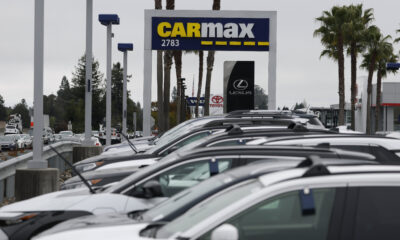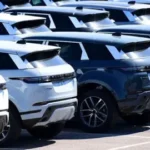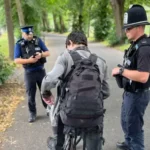Business
Vinted users furious over InPost UK parcel delays

Read more on post.
Users of the second-hand shopping app Vinted have taken to social media in outrage over severe delays in receiving their orders via one of the firm’s partner couriers.
Posts seen by the BBC describe parcels not being collected from InPost UK lockers or left stuck in transit without updated tracking information.
Some customers were notified their items had been delivered but had not received them, while others reported technical faults at lockers during collection.
InPost UK, which distributes parcels to lockers for customers to collect, has apologised for network “delays” caused by an IT issue.
Sonia Fallows, from Manchester, is waiting for a delivery of second-hand toy building blocks she ordered from Vinted.
She told the BBC: “It’s been stuck in the warehouse for eight days without being scanned.”
“I have spoken to them every day and they keep running circles around me. They are just not doing anything.”
Ms Fallows said she was a regular user of the courier service, which was “usually really good” but was now left frustrated.
“I have got some favourite sellers on Vinted, but if they are going to use InPost I just won’t use them anymore,” she added.
On its website, InPost UK blamed the problems on a “software integration issue”.
It said it had “isolated the root cause” and was “making significant progress” on resolving the problem.
However, some InPost UK users were told the issues would be resolved by Wednesday but have been left waiting for their parcels.
Posting on X, one woman described how she was given a new delivery date for 22 October, adding she “won’t use Inpost ever again”.
Another posted: “Here we all still are in the dark about where are parcels are and when they will arrive.”
InPost acquired parcel delivery firm Yodel in May, a move that the two companies said would create one of the largest logistics firms in the UK.
At the time of the deal, InPost UK chief executive Neil Kuschel announced plans to expand and handle more than 300 million parcels a year, saying the company was “reshaping the future of parcel delivery”.
Business
Jaguar Land Rover restarts some IT systems after cyber-attack
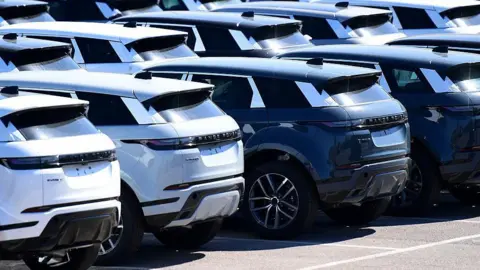
Read more on post.
Michael RaceBusiness reporter,
Elizabeth GlinkaPolitical editor, BBC Midlands and
Theo LeggettInternational business correspondent
Jaguar Land Rover (JLR) says it has begun a “phased restart” of its operations with parts of its IT system back up and running.
The company said it was “working to clear a backlog of payments” to suppliers as it now had increased its processing capacity for invoicing.
The carmaker’s production lines have been suspended since a cyber-attack in August forced the company to shut down its IT networks. Its factories remain closed until next month at the earliest.
The prime minister said the government was “working 24/7” on a support package for suppliers amid growing concerns that some, mostly small businesses, could go bust due to the prolonged shutdown of operations.
Sir Keir Starmer said the situation faced by suppliers was “urgent”, but admitted no support plan had yet been finalised.
“I am acutely aware of the urgency of the situation and the difficulties that many of these companies are inevitably finding themselves, through no fault of course of their own,” he told the BBC.
Various ideas have been put forward over how the government could step in to support suppliers of JLR until car production is restarted.
The company said on Thursday that its recovery programme was “firmly under way” and that its global parts logistics centre, which supplies spare parts that service customers’ vehicles, “returning to full operations”.
“The financial system we use to process the wholesales of vehicles has been brought back online and we are able to sell and register vehicles for our clients faster, delivering important cash flow,” the company added.
The carmaker said it recognised that the situation was a “difficult time for all connected with JLR”, with no new cars being built and staff being sent home from work.
The manufacturer, which is owned by India’s Tata Motors, typically builds about 1,000 cars a day at its three factories in Solihull and Wolverhampton in West Midlands, and Halewood in Merseyside.
Workers have been told to stay home since 1 September, with no firm return date.
About 30,000 people are directly employed at the company’s plants with about 100,000 working for firms in the supply chain. Some of these firms supply parts exclusively to JLR, while others sell components to other carmakers as well.
Calls have been made to support suppliers, whose businesses are under threat as a result of the knock-on impact of the cyber attack.
One idea being explored is the government buying the component parts the suppliers build, with the aim of keeping the companies in JLR’s supply chain in business until production lines are up and running again.
However, firms have told the BBC they are sceptical about the success of such a scheme.
The government “simply don’t understand the complexity of what they’re dealing with”, said one supplier.
“We don’t need promises, we need help.”
The prime minister said the business secretary, Peter Kyle, was “working 24/7 with those businesses to come up with a viable way of solving this and supporting them in this crucial period”.
Unions have called for a Covid-style furlough scheme, but ministers have ruled this out given its likely cost, sources have told the BBC.
While the purchase and stockpiling of car parts by the government is an option on the table, this would present considerable logistical challenges.
JLR’s manufacturing process relies on the right part arriving at the right place, at the right time.
Another option being considered is government-backed loans to suppliers, though this is understood to be unpopular with suppliers.
Business
Jaguar Land Rover restarts some IT systems after cyber-attack

Read full article on post.
Michael RaceBusiness reporter,
Elizabeth GlinkaPolitical editor, BBC Midlands and
Theo LeggettInternational business correspondent
Jaguar Land Rover (JLR) says it has begun a “phased restart” of its operations with parts of its IT system back up and running.
The company said it was “working to clear a backlog of payments” to suppliers as it now had increased its processing capacity for invoicing.
The carmaker’s production lines have been suspended since a cyber-attack in August forced the company to shut down its IT networks. Its factories remain closed until next month at the earliest.
The prime minister said the government was “working 24/7” on a support package for suppliers amid growing concerns that some, mostly small businesses, could go bust due to the prolonged shutdown of operations.
Sir Keir Starmer said the situation faced by suppliers was “urgent”, but admitted no support plan had yet been finalised.
“I am acutely aware of the urgency of the situation and the difficulties that many of these companies are inevitably finding themselves, through no fault of course of their own,” he told the BBC.
Various ideas have been put forward over how the government could step in to support suppliers of JLR until car production is restarted.
The company said on Thursday that its recovery programme was “firmly under way” and that its global parts logistics centre, which supplies spare parts that service customers’ vehicles, “returning to full operations”.
“The financial system we use to process the wholesales of vehicles has been brought back online and we are able to sell and register vehicles for our clients faster, delivering important cash flow,” the company added.
The carmaker said it recognised that the situation was a “difficult time for all connected with JLR”, with no new cars being built and staff being sent home from work.
The manufacturer, which is owned by India’s Tata Motors, typically builds about 1,000 cars a day at its three factories in Solihull and Wolverhampton in West Midlands, and Halewood in Merseyside.
Workers have been told to stay home since 1 September, with no firm return date.
About 30,000 people are directly employed at the company’s plants with about 100,000 working for firms in the supply chain. Some of these firms supply parts exclusively to JLR, while others sell components to other carmakers as well.
Calls have been made to support suppliers, whose businesses are under threat as a result of the knock-on impact of the cyber attack.
One idea being explored is the government buying the component parts the suppliers build, with the aim of keeping the companies in JLR’s supply chain in business until production lines are up and running again.
However, firms have told the BBC they are sceptical about the success of such a scheme.
The government “simply don’t understand the complexity of what they’re dealing with”, said one supplier.
“We don’t need promises, we need help.”
The prime minister said the business secretary, Peter Kyle, was “working 24/7 with those businesses to come up with a viable way of solving this and supporting them in this crucial period”.
Unions have called for a Covid-style furlough scheme, but ministers have ruled this out given its likely cost, sources have told the BBC.
While the purchase and stockpiling of car parts by the government is an option on the table, this would present considerable logistical challenges.
JLR’s manufacturing process relies on the right part arriving at the right place, at the right time.
Another option being considered is government-backed loans to suppliers, though this is understood to be unpopular with suppliers.
Business
‘Film me all you want’ – teenage girls with no fear of police torment one High Street
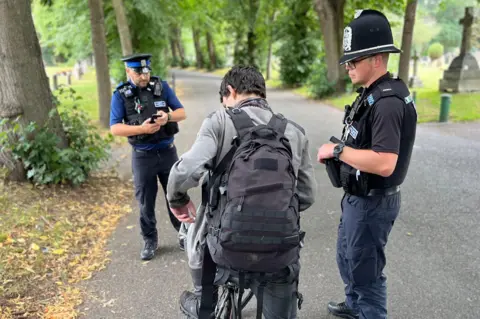
Read more on post.
Dan JohnsonBBC News and
Sophie WoodcockBBC News
 BBC
BBCThe teenager’s sense of invincibility is clear. “The police are never ever going to help you,” she says, “you can film me all you want”.
She’s refusing to leave a shop caught at the centre of a prolonged campaign of antisocial behaviour – windows smashed, items stolen, fires started, staff threatened and attacked.
Muhammad Usman, owner of the mobile phone store in Shirley, near Southampton, is filming her on his own phone – and her juvenile bravado is in full flow. “Touch me and I’ll get you done for assault,” she warns him.
“It’s getting worse, day by day,” Muhammad later tells us from behind his till. His voice cracks, clearly worn down by months of abuse – including, he says, a threat by a teenager to kill him. “I’ve never had this kind of experience in my life before. We’re feeling so helpless.”
What Muhammad and other shopkeepers have experienced over recent months captures the challenge antisocial behaviour poses to police, councils and communities at a time when the government has said tackling it is a key priority.
Three doors down, on the same High Street, Nnenna Okonkwo is also feeling under siege. “It’s ridiculous that it’s just a couple of teenagers causing this mayhem,” she says through tears.
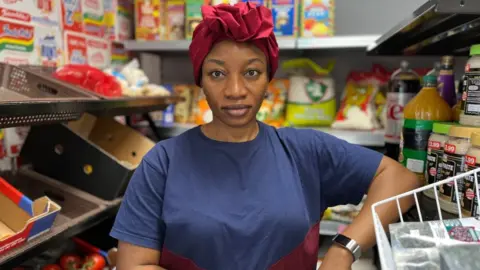
But these don’t seem to be hooded gangsters armed with weapons.
When I eventually encounter the gang, I’m faced with a 14-year-old girl in pink leggings and Crocs.
“I’m not claiming to be innocent because I’m not,” she tells us. “I’ve threatened people and I’ve hit people, I’ll admit to that.”
“The second you get into one bit of trouble with the police, you fall into it too deep and you can’t get out,” she adds.
She says an injury forced her to give up sport and that behaving badly offers an alternative energy release. “I found that I get the same adrenaline boost from being in trouble with the police and being missing and stuff.”
But there’s little remorse. “I regret what I do, but I don’t say sorry,” she says to cheers from the rest of the gang.
She seems bright but deeply troubled. She admits drinking and she’s vaping while we talk. Muhammad had already told us he had experienced racist abuse – something the girl firmly denies being involved in.
One of her friends chimes in. “I know what we’re doing is wrong but we’re teenage kids, we’re going to have a bit of fun,” she tells us. “I’m sorry for most of the people we have damaged, but I have no sympathy… it’s just one way of taking my anger out.”
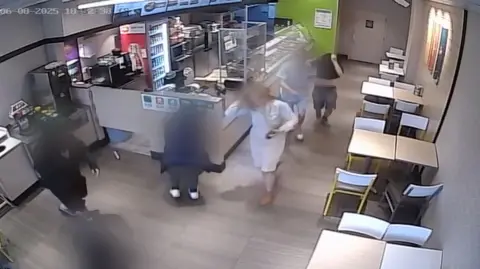
Responding to this BBC report, Prime Minister Keir Starmer said: “Let me be really clear what we’re seeing [in Southampton] is completely unacceptable. That shouldn’t be happening in any community.”
He said people committing anti-social behaviour “should be fearful that they’re going to feel the full force of the law”.
Labour was elected last year promising new “respect orders” to ban similarly persistent offenders from town centres. Due to be introduced under the Crime and Policing Bill currently going through Parliament, breaching the orders would be a criminal offence with potential penalties including a two-year prison sentence, unlimited fines, or unpaid work.
That would partially replace existing civil injunction powers. But the respect orders would not apply to under-18s. An amendment aims to bring that down to 16, but would still not apply to anyone younger.
Ministers have also promised more neighbourhood policing. In Shirley, Muhammad’s complaint is not the number of officers, but their apparent lack of power or willingness to tackle the teenagers. “You don’t see any action against them,” he says. “You feel they are above the law.”
‘We need to be more robust’
The local beat officer, PC Tom Byrne, says he recognises the concern and that antisocial behaviour is being dealt with.
“We do need to remember we are dealing with young people,” he told BBC News in July, saying that while “there will be consequences”, these need to be appropriate when it comes to children.
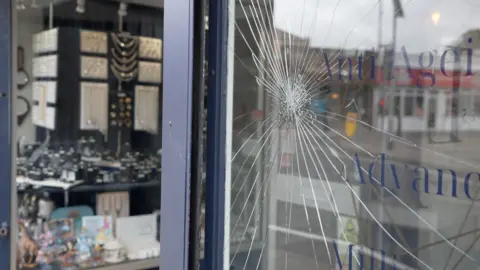
Such instincts to keep young people away from the criminal justice system are deep-rooted in policing – perhaps in the hope antisocial behaviour fizzles out. However, the problem has got worse over the long, hot summer of 2025.
Behaviour like this isn’t just happening on one High Street, and it’s not just teenagers. A few miles along the south coast in Portsmouth, Neil Gibson knows the cost of repeated antisocial behaviour. His car repair business has been hit repeatedly, he believes by the same group of young men. Security camera footage shows one hooded youth hammering a windscreen with a broom until it smashes.
Neil spends some evenings remotely checking his security cameras from home. “I did phone [the police] and say look, if you send someone now, you’ll catch them – perfect situation. I’m afraid they weren’t interested.”
Disheartened, he says he no longer reports every incident.
In nearby Fratton, a former industrial part of Portsmouth now largely residential, we see what the police are up against.
Patrolling the cemetery one evening, PC Chris Middleton attempts to stop a young man zipping down a footpath on an electric scooter – but the masked figure simply ignores the constable and speeds off.
We ask PC Middleton if he can see why some people believe the police are powerless. “Yeah, I feel it,” he says. “At times I really do feel that we need to be more robust and we need more support from the government to tackle these things.”
A short while later, a convicted shoplifter who is wanted on recall to prison walks past – he is searched and arrested.
It’s a similar story for councils, many of whom across the country are using community wardens to keep a grip on antisocial behaviour. Jason, a warden for Portsmouth City Council, tells us “a lot of police stuff is being downgraded to antisocial behaviour”, multiplying his workload.
Cllr Matt Boughton, chair of the Local Government Association’s safer and stronger communities committee, has a similar view – telling BBC News that councils “are increasingly having to step in when police resources are stretched…putting extra pressure on already stretched councils, pressure which is unsustainable”.
How can these issues in the communities we’ve visited – and many others like them across the country – really be solved, then?
‘I regret all of it’
Someone whose role involves working alongside the wider criminal justice system is Donna Jones, Hampshire’s police and crime commissioner (PCC). The former Conservative councillor feels the police need a change of approach to dealing with youths and their parents.
“I think the response from the police, to be absolutely honest with you, has been to take a slightly slower approach but some of these young people are committing some really horrible, nasty offences,” she tells us while visiting shopkeepers in Shirley. She says they are being plagued by “an urban street gang made up of quite a high number of young girls”.
“What we need to be doing is also putting the parents more on the record for some of this stuff too so perhaps some change in legislation that does make parents much more accountable.”

Authorities already possess a range of powers, including civil injunctions, community protection notices, dispersal orders and criminal behaviour orders – the original antisocial behaviour order (ASBO) was replaced in 2014. They can also fine parents and even remove social housing.
But not all of these are applicable to children, and using the ones which are, at scale, will end up criminalising more children. Such measures require time and evidence to obtain, straddling police and councils and concerning often vulnerable young people.
There have been arrests. A teenager has now been charged with 22 offences, including assault, theft, arson, criminal damage, breaching a dispersal order and racially aggravated harassment. The teenager appeared at Southampton Youth Court last week and is due to appear again next month.
After months of persistent antisocial behaviour, the situation in Shirley has calmed down in recent weeks.
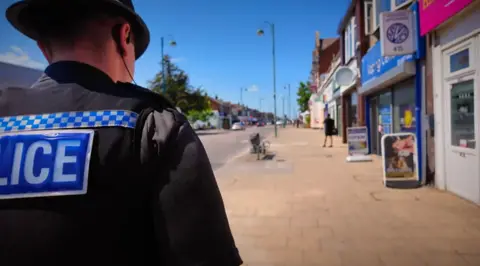
Responding to the BBC, Policing Minister Sarah Jones said “for too long, people have not seen police patrolling their streets”. She said “this government has increased police patrols in high-crime areas across the country through our Safer Streets Summer Initiative”.
Pledging 3,000 more neighbourhood police on the beat by March 2026, she said “we are sending a clear message: crime will be punished”.
And on Thursday the prime minister is due to announce measures to give communities more power to “seize boarded shops” and “block gambling and vape shops on their High Street”.
Hampshire Police told us it had “endeavoured to respond to as many reports as possible” of antisocial behaviour on Shirley High Street but “had to ensure this was balanced against the increase in emergency calls” over the summer months.
Away from the mayhem, we did find some more positive news.
As the summer draws to a close and kids return to school, Jaiden, 15, recalls the hours he spent in a police cell after being arrested. From the sofa of his home in Shirley, he tells us he was causing trouble at shops “nearly every day”.
“It was fun getting people mad but then I realised after a while it wasn’t.”
His mum Kylie says she pleaded with the police to act, having felt she’d lost her son to peer pressure. “Two or three times I asked them ‘just arrest him’. They said we can’t due to his age, we’re going to just have to bring him home. There’s not much we can do.”
He reads the list of rules he and his mum have since signed in a voluntary “acceptable behaviour contract”. They include him not stealing, making threats, or using foul or abusive language and leaving shops when ordered. If he complies, he can avoid court.
Jaiden vows to never go back to that way of life. “I regret all of it,” he says.
Correction: This story has been updated to remove a reference about an earlier court date, involving a teenager, which did not go ahead.
-
Culture2 days ago
Taylor Swift’s new cinema outing generates more than €12million in just 24 hours
-
Politics2 days ago
European Parliament snubs Orbán with vote to shield Italian MEP from Hungarian arrest
-
Culture2 weeks ago
Life, loss, fame & family – the IFI Documentary Festival in focus
-
Health3 days ago
EU renews support for WHO’s Universal Health Coverage Partnership
-
Culture2 months ago
Fatal, flashy and indecent – the movies of Adrian Lyne revisited
-
Culture2 days ago
Twilight at 20: the many afterlives of Stephenie Meyer’s vampires
-
Environment6 days ago
Key oceans treaty crosses threshold to come into force
-
Culture1 week ago
Farewell, Sundance – how Robert Redford changed cinema forever






